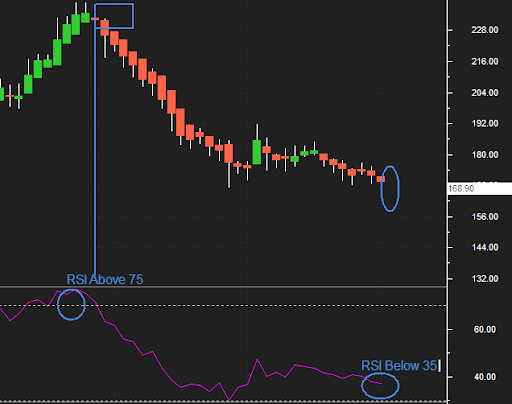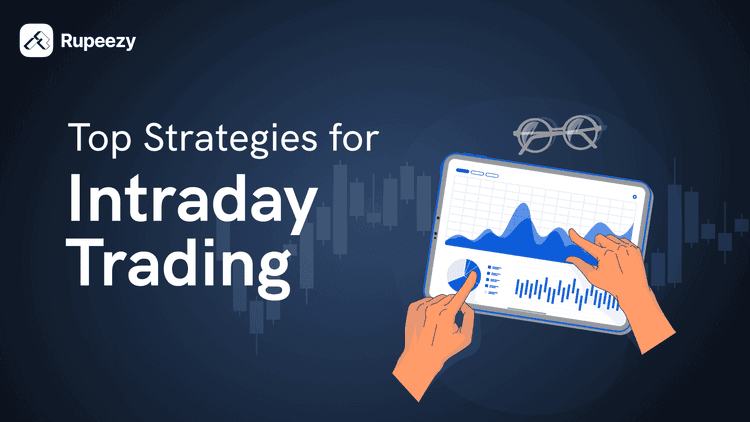What is Intraday Trading? Meaning, Benefits, Types


00:00 / 00:00
Trading in the Indian market is on the rise as the total number of traders in India has jumped to 140 million in 2023 from just around 30 million Indians in 2019. Among the different types of trading, intraday trading has also caught the attention of many traders due to the possibility of making good returns in a short periods. In this article, we will first understand what is intraday trading, how one can get started and also the risks involved. Keep reading to find out more!
The Basics of Intraday Trading
Intraday trading involves buying and selling assets like stocks and others within a single trading day. Unlike long-term investment and other forms of trading, the goal in intraday trading is to capitalise on short-term stock price movements. Here are some essential details about intraday trading that will be useful.
Intraday Trading Jargons
Intraday trading has some terminologies that every trader must know. Here are some of them.
Bid/Ask price: This is the highest price an intraday buyer is willing to pay and the lowest price a seller is willing to accept for their stock.
Spread: This is the difference between the bids and ask price within a day.
Volatility: This is the extent to which the price of an asset fluctuates in a given day.
Liquidity: This indicated how easily a stock can be bought or sold in the market without affecting its price.
Basic Rules of Intraday Trading
As an intraday trader, there are certain rules you must adhere to to make the most out of your trades. Here are some of them.
Develop a Trading Plan: Ensure you define your entry and exit points, a risk management strategy, and your investment goals clearly.
Start Small: Do not be afraid to start small with a small amount of capital to manage risk while you learn the ropes and aim for growth.
Discipline is Key: Come up with a plan, then stick to it to ensure you avoid emotional trading decisions that might be costly.
Benefits of Intraday Trading
Here are some of the top benefits of intraday trading:
Limited risk exposure: Since you must square off all positions before market close, there are no overnight risks of holding trades.
Leverage potential: Top brokers like Rupeezy allow you to borrow more capital than your account size; this is called leverage in the stock market. With leverage, you can amplify potential profits from short-term price moves.
Frequent opportunities: The continuous intraday market fluctuations provide multiple trading signals that you can potentially profit from.
Quick results: Unlike long-term investing, with intraday trading, you realize profits or losses quickly within a single trading session.
Capital efficiency: Since there is no overnight exposure, you can deploy your capital more efficiently by trading the same amount multiple times a day.
Intraday Trading Features
Here are some common intraday trading features:
Leverage: As stated, you can borrow money from your broker to trade with more capital than what’s in your account so that you amplify potential profits and losses. However, it is also important to understand the risks that come along with leveraging.
Advanced charting: Intraday traders heavily rely on technical analysis tools like candlestick charts, indicators, and drawing tools so that they can identify trade setups.
Research: The best intraday traders have access to in-depth research reports, analysis, and expert views. This is to aid them in making the best possible trading decisions based on fundamentals.
Efficient order execution: The best intraday trading platforms like Rupeezy, which has fast order execution, are your best bet so you can easily capitalize on fleeting intraday opportunities.
Intraday Trading Indicators

RSI indicator for buy and sell signals
Intraday trading comes with a host of indicators that guide trader’s decision-making and next movements. As a trader, you have to master these indicators and incorporate them into your decision-making. Here are some of them:
Relative strength index (RSI): This indicator is designed to measure the momentum of a stock. RSI measures the speed and size of price changes. You use it to identify overbought or oversold conditions and potential trend reversals.
Bollinger bands: Consists of a simple moving average with upper and lower bands. These bands help you spot high volatility periods and potential entry/exit points.
Moving average convergence divergence (MACD): MACD shows the relationship between two moving averages. You can use it to identify new trends, shifts in momentum and potential entry and exit points for trades.
On Balance Volume (OBV): OBV helps track volume flow which inturn helps predict the changes in stock prices. It indicates whether money is entering or exiting a stock. Divergences between price and OBV signal potential reversals.
Average Directional Index (ADX): This indicator helps you quantify and determine the strength of a trend. High values mean there is a strong trend you could capitalize on, while low values signal a potential trend change.
Different Types of Intraday Trading
Below are some of some of the most popular intraday trading:
Stock trading: Many stock market newbies also ask “what is intraday trading in stocks?” Well, here you buy and sell shares of a listed company within the same trading day. The aim is to make profit from their price fluctuations.
Commodity trading: Commodities like gold, crude oil, or agricultural products also have good intraday opportunities. Global supply/demand factors are what drive these opportunities.
Forex trading: Forex trading involves exchanging one currency for another with the goal of making a profit. The highly liquid foreign exchange market aids in this trading and traders can capitalize on short-term price movements.
Index trading: Major indices like the Nifty or Sensex also have some of the best intraday trading prospects. The broader market sentiments always influence its price swings.
The Risks Associated With Intraday Trading
While intraday trading is known for its quick profits, it also comes with a host of risks. One of these risks is the volatile nature of the market, which can translate to enormous losses in the event of a clumsy execution of trade. Apart from that, there is also the pressure of making split-second decisions which can be stressful and tiresome to some people.
However, despite these risks, many traders prefer intraday trading because of its many benefits, especially if they use good brokers like Rupeezy. If you research well, have proper risk management, and, most importantly, are disciplined, you will achieve success with intraday trading.
Conclusion
Intraday trading involves making use of price movement within a day to make a profit. However intraday trading comes with its own set of benefits and risks that are important to understand before one starts trading. As intraday trading may include many variables that are out of your control it is very important that you work hard to reduce one’s that you can control. One aspect that many intraday traders have suffered from in the past has been choosing the right trading app. Rupeezy has been enhancing traders experiences for the last 20 years with more than 2 lakh users. Open demat account with Rupeezy today to start your intraday trading journey. Happy Trading!
The content on this blog is for educational purposes only and should not be considered investment advice. While we strive for accuracy, some information may contain errors or delays in updates.
Mentions of stocks or investment products are solely for informational purposes and do not constitute recommendations. Investors should conduct their own research before making any decisions.
Investing in financial markets are subject to market risks, and past performance does not guarantee future results. It is advisable to consult a qualified financial professional, review official documents, and verify information independently before making investment decisions.
Open Rupeezy account now. It is free and 100% secure.
Start Stock InvestmentAll Category









